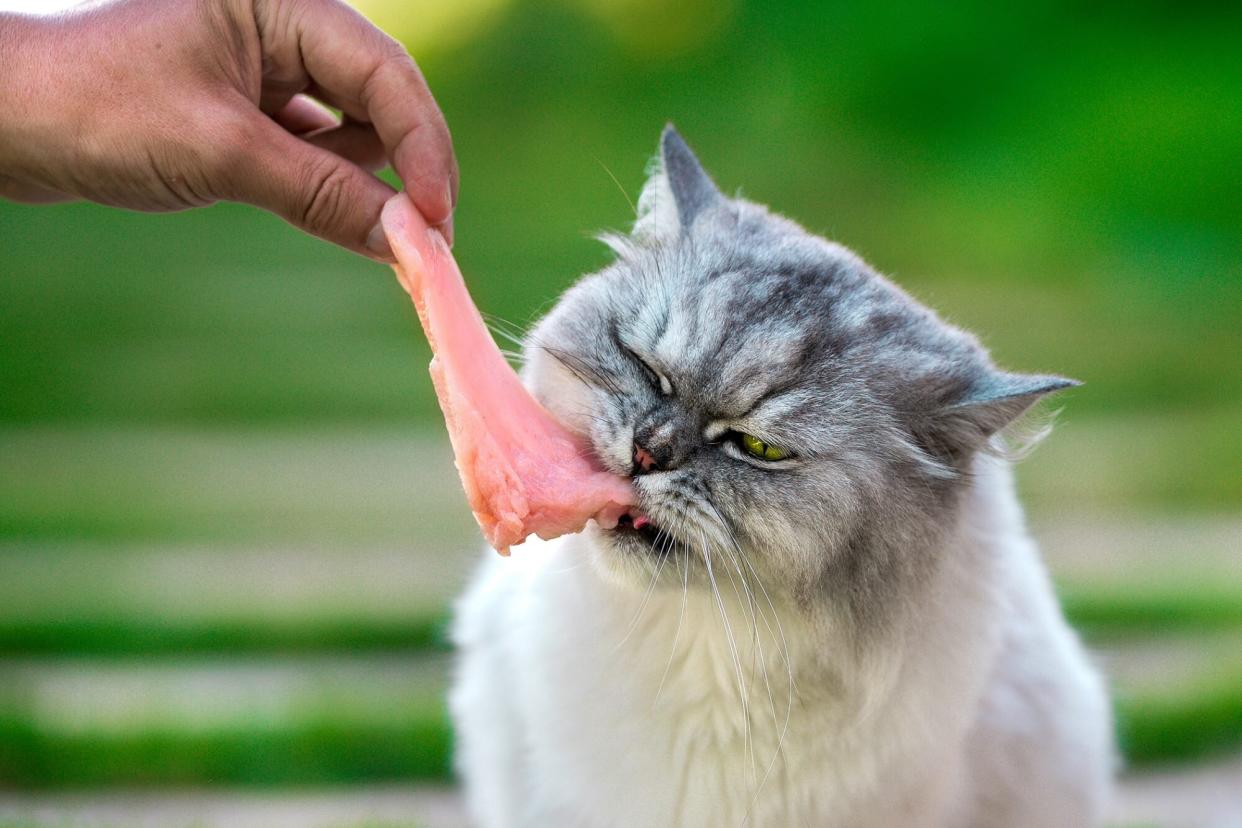Can Cats Eat Raw Chicken? Everything You Need to Know Before Feeding your Feline Raw Meat

Daria Kulkova / Shutterstock
Your domesticated cat's diet is likely already full of cooked and processed chicken, but felines in the wild eat raw meat all the time, which may make you wonder: Can cats eat raw chicken?
The answer is tricky. Whether you're debating feeding your pet a raw diet or just want to give your kitty a snack as your cook dinner, speaking with your veterinarian is the best way to keep your cat safe.
Can Cats Eat Raw Chicken?
Yes, cats can eat raw chicken, but doing so comes with risks and is not necessarily recommended, says Renee Schmid, DVM, DABVT, DABT, a veterinarian toxicologist who works with Pet Poison Helpline.
Cats are obligate carnivores, meaning they must eat animal products to survive. They thrive on high-protein diets with substances found in meat, such as fatty acids, taurine, and other essential vitamins. Supporters of a raw food diet for cats believe that mimicking a wild cat's diet—which would be filled with raw meat, bones, and organs—is ideal, as cooking meat can alter the vital nutrients in meat.
RELATED: Is Salmon Good for Cats?
However, in 2012, the American Animal Hospital Association, with the endorsement of the Association of American Feline Practitioners, provided a statement against raw food diets for cats:
"Homemade raw food diets are unsafe because retail meats for human consumption can be contaminated with pathogens," the statement reads. "Many of the pathogens found in raw protein diets can be transmitted to the human population by contact with the food itself, pet or environmental surfaces. A disturbing number of these organisms have also been shown to be resistant to multiple antimicrobials."
The best way to keep your cat safe? Consult your vet before introducing any new foods to your cat's diet, especially raw meat.
What Are the Risks of Feeding Cats Raw Chicken?
Parasites and Bacteria
While cats can digest raw meats better than humans, they're still at risk for contracting serious illnesses from harmful bacteria and parasites.
"Eating any type of raw meat poses potential safety concerns with bacteria, particularly Salmonella and Campylobacter, as well as potential exposure to parasites, all of which may cause GI distress and potential systemic illness," Schmid says.
If your cat eats raw chicken and shows signs of intestinal upset, contact your veterinarian right away.
Bones
Small pieces of bones can seriously harm your cat, as the bones found in raw chicken can get lodged in the esophagus, stomach, or intestinal tract and cause a choking hazard. In some cases, sharp pieces of bone can pierce the intestinal tract, which can cause life-threatening sepsis, Schmid says.
Nutritional Deficiency
"Raw chicken itself does not have a complete nutritional profile, so it should not be fed as the sole food," Schmid explains.
Cats need an adequate level of taurine, which is essential for your kitty's heart health. Veterinarian-approved cat food is the best way to provide your cat with the essential nutrients needed for a healthy, balanced diet.
What Should I Do If My Cat Accidentally Ate Raw Chicken?
If your cat ate raw chicken that wasn't properly prepared, it's important to keep an eye on your cat contact your veterinarian if you notice any of these symptoms:
Lethargy
How To Safely Prepare Raw Chicken for Cats
If you're set on feeding your cat raw chicken (or any raw meat), it's important to speak with your veterinarian. While cats eat raw meat in the wild, your domesticated kitty is used to processed, cooked food. If your vet gives the OK to introduce raw chicken into your cat's diet, here are a few safety tips to keep you and your kitty safe.
1. Make sure the chicken is fresh.
First, it's important to purchase fresh, raw chicken from reputable stores. Don't wait long to feed this to your cat, as bacteria can grow the longer chicken ages. You may also consider raw chicken that's marketed for pets, which is typically processed to add vital nutrients and reduce the risk of harmful bacteria.
RELATED: 10 Toxic Human Foods Dogs & Cats Should Never Eat
2. Prep the chicken with care before serving.
When preparing the chicken, cut the meat on a clean surface with a clean knife and remove any bones before serving. Only give your cat what they can eat in one sitting; any leftover meat will need to be discarded. After you've fed your cat, remove any leftover chicken and be sure to throw out any raw meat that reaches room temperature. Once your cat is done eating, wash their bowl with soap and hot water.
3. Clean surfaces to avoid the spread of bacteria.
As you prepare the raw chicken, thoroughly clean surfaces where the meat is placed to avoid contamination to yourself and other humans. If you're looking for an easier (and safer) way to feed your cat homemade chicken, you can cook the meat by boiling or grilling it without any added salt or seasoning. Common seasonings like garlic, onion, and salt are toxic to cats and should be avoided.

